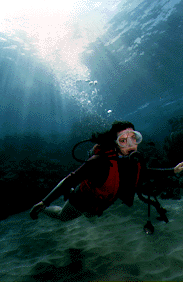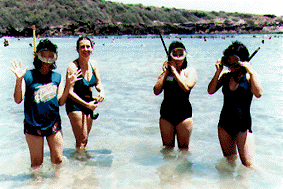Eco-Diving and Snorkeling
Have you ever been snorkeling or scuba diving? Scuba divers, of course, must pass a safety and skills course to become certified divers. Snorkelers, however, can just put on a mask, snorkel and fins and walk straight into the water.
 Tourists staying at beach resorts are surprised that it is so easy to see many beautiful tropical fish and colorful coral. On a day at the beach, they cover themselves with suntan oil and then decide to go snorkeling for a bit. I don’t think the fish really appreciate the suntan oil. On the other hand, swimmers must protect themselves from the ultra-violet rays of the sun.
Tourists staying at beach resorts are surprised that it is so easy to see many beautiful tropical fish and colorful coral. On a day at the beach, they cover themselves with suntan oil and then decide to go snorkeling for a bit. I don’t think the fish really appreciate the suntan oil. On the other hand, swimmers must protect themselves from the ultra-violet rays of the sun.
At spectacular Hanauma Bay on Oahu in Hawaii, busloads of tourists used to arrive everyday to snorkel and sunbathe. Tourists were given equipment and even packets of crackers to feed the fish. The fish would surround the swimmer and grab at the food. But soon, there were many cellophane wrappers from the crackers floating in the water. And crackers are not a nutritionally-balanced food for fish.
Hanauma Bay on Oahu attracts many tourists who try snorkeling for the first time.¬Ý
Do they know this is a delicate marine environment?
Soon changes in policy were necessary at Hanauma Bay. No more buses were allowed. Approved fish food was sold at the snack bar. Rules were posted by the Hawaiian Parks Department to inform visitors about the right behavior in this marine sanctuary. Still, few people read them.

Have you ever gotten tired while snorkeling and looked for some rock to stand on while you catch your breath and adjust your mask? Do you really know what you are standing on? It is probably coral.¬Ý
What is coral? Coral is made up of the skeletons of millions of tiny animals. ‘Corals’ are a very primitive group of animals that have evolved over millions of years. Can you believe that coral reefs in 90 out of 109 countries are being damaged? This damage is by cruise ship anchors and sewage, by tourists breaking off chunks of coral and by commercial harvesting of coral to tourists¬Ýand tropical fish to pet stores worldwide.
When you take a vacation package to a tropical island, usually the travel company gives an information booklet about the destination. Usually there are tips of how snorkelers should protect themselves from coral scratches. Shouldn’t the booklet also advise how to protect the coral from snorkelers?

